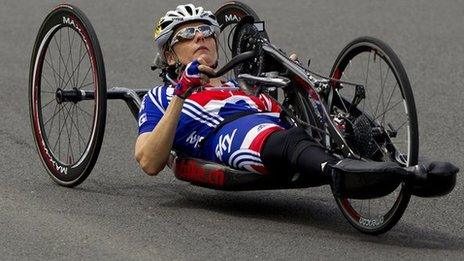IPC European Championships: Sascha Kindred aims for success
- Published
Sascha Kindred aiming for European success
A lifetime has passed since Paralympic champion Sascha Kindred first swam for Great Britain.
Now, 20 years after making his international debut as a 15-year-old, he is aiming to win more medals at the IPC European Championships in Eindhoven which start on Monday.
The world of Paralympic sport has changed completely over that time and Kindred has been through it all, from his mother getting money together to help him attend training camps as a youngster to the freedom of Lottery funding, and from a shy teenager to a husband and father. But success has been a constant.
Kindred has won 12 Paralympic medals, including six golds, across five Paralympic Games as well as a host of World and European titles, but even at the age of 35, he still loves his sport and is hungry for more medals.
He is part of a 30-strong team in Eindhoven with fellow experienced campaigners Ellie Simmonds and new Commonwealth champion Ollie Hynd as well as the likes of Amy Marren, Steph Slater and Tom Hamer, who will be competing at their first Europeans.
Born with a form of cerebral palsy, known as hemiplegia, which affects the right-hand side of his body, Kindred made his GB debut at the 1994 World Championships in Malta, where he won a bronze in the SB7 breaststroke.
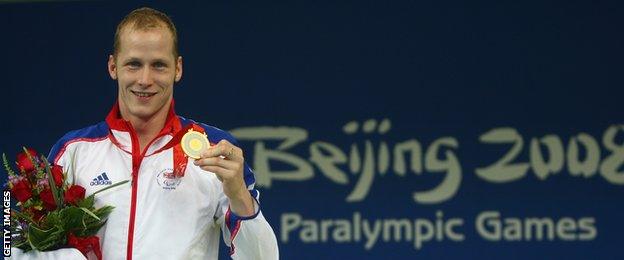
Kindred won two golds at the Beijing Paralympics, his fourth Games
Among the other GB debutants at the competition were Jody Cundy, who went on to win cycling golds at the Beijing Paralympics and Giles Long, who is now a television presenter.
The more experienced figures in the squad were Tim Reddish, now the chairman of the British Paralympic Association, and Lord Chris Holmes, the director of Paralympic integration at London 2012, while a young Sarah Bailey (now Dame Sarah Storey) was the team's rising star having won two golds at the Barcelona Paralympics a couple of years earlier as a 14-year-old.
"Although I was an athlete, I didn't feel like the full package," recalls Kindred.
"The feeling of it being elite sport wasn't there and the competition was more of a celebration of sport.
"We trained as hard as we could, but we also had to support ourselves financially. Lottery funding, which started in 1997, is probably the biggest change we have experienced in the years I have been competing. Between that and support from British Swimming and sponsors, it has become more elite.
"Paralympians have now become household names and are getting recognition. It is great for the Paralympic movement that is happening."
But it was not all plain sailing and Kindred's first Paralympic Games experience in Atlanta in 1996 was not a happy one.
Sascha Kindred facts |
|---|
Born 13 December 1977 in Germany |
Has a twin brother Timo |
He is a big Manchester United fan |
He is married to fellow swimmer Nyree Lewis, who won backstroke gold in Athens and silvers in both Beijing and London |
"I was so chuffed to be part of the squad and making my Games debut," he recalls.
"But looking back, and having experienced four Games since then, it was shocking.
"Parts of the village were being torn down while we were there, the food queues were long and the entertainment for the athletes was non-existent.
"Thankfully the Paralympic Games has moved so much then and in London it was an amazing Games to be part of."
Coming into London, Kindred was hopeful of winning another Paralympic gold but finished with a breaststroke silver medal, watched on by wife Nyree, who herself won silver in her backstroke event, and daughter Ella.
And the three-year-old has brought about a big change in the couple's lives.
"I'm still very focussed on my swimming and it is the priority but also on the same level, having a family is a massive focus," he says.
"I enjoy swimming far more because when I finish my training I can go home and play with my daughter. My coach Emma Patrick says I now smile in the morning when I never used to."
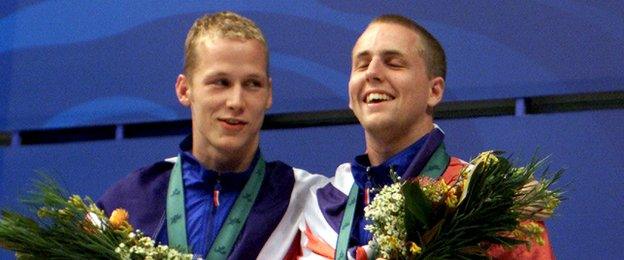
Kindred and team-mate Matt Walker competed together at the 2000 Sydney Paralympics and will both race in Eindhoven
But he admits that he feels a pang of envy when he sees the opportunities which youngsters who come onto the GB squad today are given.
"When I was younger with a twin brother and a single mum, all the spare money was ploughed into my swimming because there was no funding and it was more difficult," he says.
"Also, it wasn't easy to find a club to swim in because I was a lot slower than the able-bodied swimmers.
"But now there is more acceptance of disability and there are more opportunities.
"Sometimes I think the younger swimmers have it easier compared to when I started but in another way I wouldn't change what I have done."
- Published19 April 2014
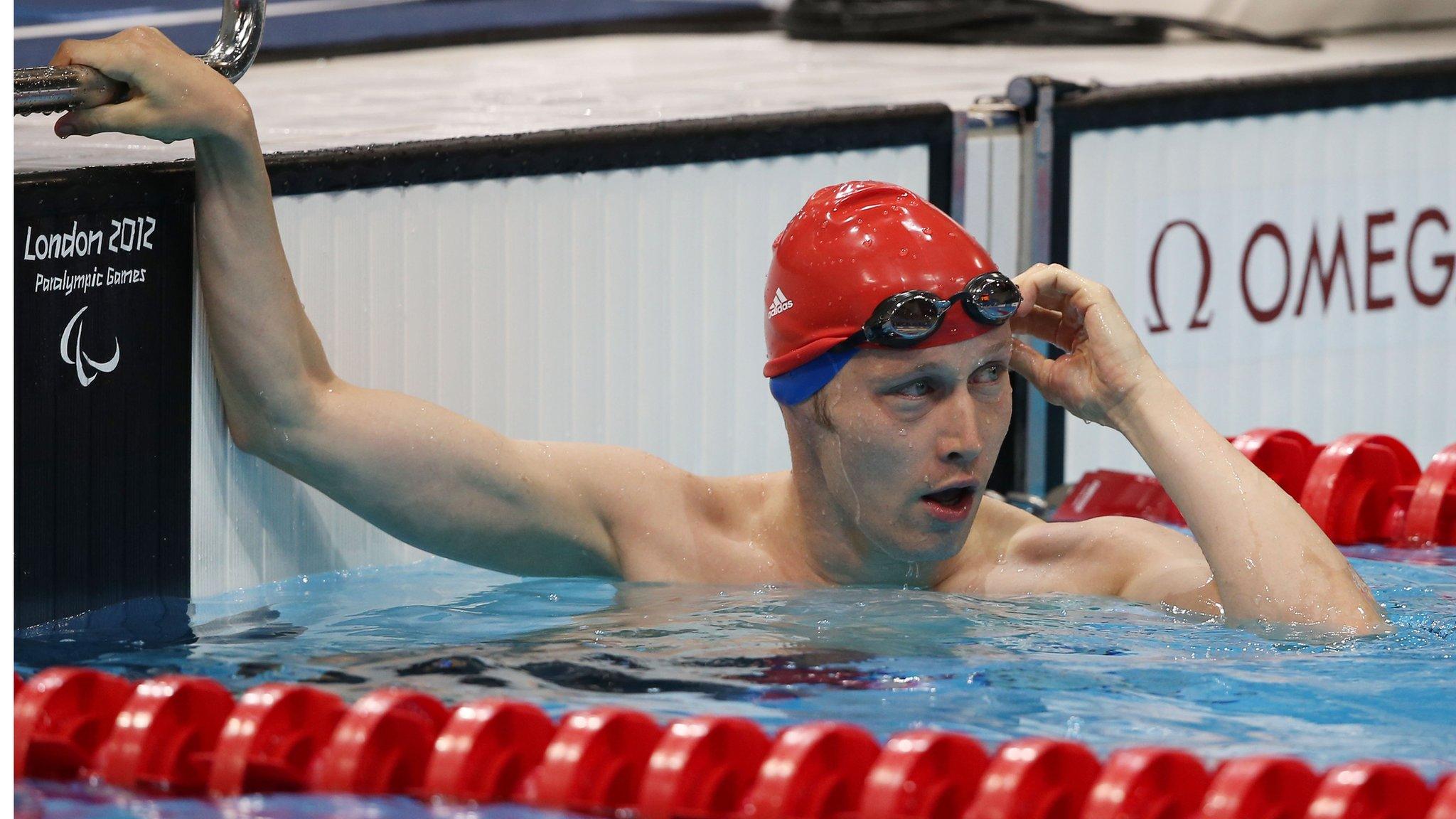
- Published16 August 2013
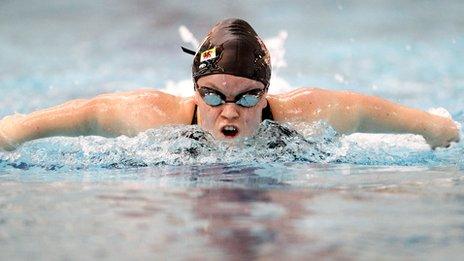
- Published27 April 2013
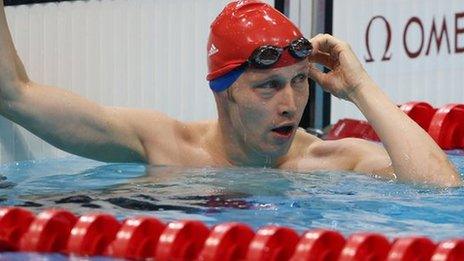
- Published7 March 2014
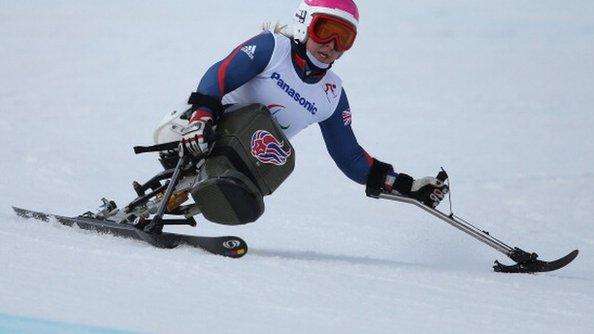
- Published5 September 2016
